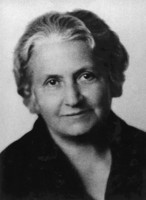Montessori
Maria Montessori (1870 – 1952)
Dr Maria Montessori was one of the most influential early years educators of the 20th century, the innovator of classroom practices and ideas which have had a profound influence on the education of
young children the world over.
Montessori lived from 1870 to 1952. She was the first woman to attend medical school in Italy and the first female Doctor of Medicine there. Through her work with handicapped and socially deprived
children, she developed her unique educational method known as the Montessori Method. Montessori saw that children learn best by doing and that happy self-motivated learners form positive images of
themselves as confident, successful people. She created specially designed resources to foster independence and a love for learning from an early age.
Montessori materials can be seen in today's Montessori Nurseries throughout the world. She was an innovator in the field of education and ideas that were once met with great resistance in her day now
seem natural as accepted aspects of childhood.
The Montessori Method is based on countless hours of objective observation of children's behavioural and intellectual development in a carefully prepared environment. It respects the child's
individuality by requiring the adult to follow the child at his/her own pace, focusing on his/her current interests, and promotes independence, self-esteem, and a healthy socialization process. It
provides the young child with mental order, self-discipline, and the ability to adapt and thrive in new environments. It promotes acceptance and encourages children to think creatively.



